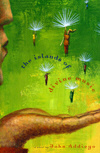The Islandsof Divine Music
Like most families, the Verbicaros are anything but ordinary. Following five generations of a close knit Southern Italian family over the span of a century, The Islands of Divine Music by John Addiego follows the Verbicaros’ journey from Italy’s boot to San Francisco to the Yucatán Peninsula. Along the way, they encounter traces of the sacred and the profane, discovering themselves in the process.
Like most families, the Verbicaros are anything but ordinary. Following five generations of a close knit Southern Italian family over the span of a century, The Islands of Divine Music by John Addiego follows the Verbicaros’ journey from Italy’s boot to San Francisco to the Yucatán Peninsula. Along the way, they encounter traces of the sacred and the profane, discovering themselves in the process.
Told in a series of vignettes, Addiego’s family saga is warm, funny and intimate. Through Rosari Cara’s young eyes, we immigrate to Ellis Island in the early 1900s, filled with excitement for the new world. Rosari meets her future husband Giuseppe Verbicaro and eventually bears him seven children in San Francisco. The incorrigible Giuseppe is “lean and hungry and ferocious as a wolf,” and, much to the dismay of his children and grandchildren, leaves Rosari after fifty years of marriage for a 17-year old Mexican prostitute, Maria. Giuseppe vows to take care of Maria’s son, Jesús, but Giuseppe dies; after which mother and son flee the Bay Area to find work up north:
They picked apples outside Hood River, Oregon, and this was the first vision of snow for mother and son, from a tall, three-legged ladder in the apple trees where Mount Hood filled the sky. These were days of beauty for her, the ache of the ladder pressing on the soles of her feet and the shape of apples in her hands. The sensation remained in her bones and in her dreams at night, along with the volcano which gleamed above her like a loving face.
Heartache and beauty are of the same tree, and these themes are woven effortlessly throughout the tale. There’s always the risk that a family drama will be too emotive or saccharine, but Addiego measures out the right dose of sentiment in each scene.
Interwoven with Jesús’s story are that of Joe Verbicaro (Rosari and Giuseppe’s youngest son) and the lives of his siblings and his five children. Joe’s oldest son Paulie tries to make sense of his life after the Vietnam War; his oldest daughter Penelope is a fugitive on the run after committing a federal crime; his brother Ludovico is a hopeless gambler; his youngest daughter Janine explores her Calabrian roots in the old country, hoping for “an epiphany, an escape from the ugliness of her own culture”; his son Angelo teams up with Paulie to find Jesús, who disappeared for many years and is now a spiritual healer in the Yucatán.
The younger generation’s rediscovery of their heritage through their spirituality is a theme that snakes through Addiego’s tale. Jesús returns physically and symbolically to Mexico to practice Mayan shamanism; likewise, Janine visits Reggio Calabria and participates in the mystical folk dance, the tarantella. When her host Marie is bitten by a tarantula, she plays the fiddle all night as Marie dances out the spider’s poison. The tarantella serves as a bridge between homelands and between life and death. While Janine performs the tarantella in Italy, her immigrant grandmother Rosari sees a tarantula in San Francisco and knows her end is near. When Marie falls to the ground hours later, exhausted but purged of the poison, Rosari succumbs to the “black fingers” of death.
As the Verbicaro family struggles to make ends meet, journeying through periods of misery and joy, they ultimately discover the magic of who they are. This is the essence of life for the Verbicaros and for all of us; we may face moments of conflict and loss, but we also hope that our families will inspire us to become better people. After reuniting with Jesús, Angelo reflects:
He walked to the café, thinking of beauty and loss and the music of the moon, the music of the spheres. He thought of his wife and daughter, of their hearts being little bolsas, purses of beauty, filled with a kind of celestial light which he could never possess, but never entirely lose, either.
Tracing the American experience from the Prohibition and the Cuban Missile Crisis to the Vietnam War and the cusp of the new millennium, The Islands of Divine Music is a heartfelt, sweeping narrative that embraces the reconciliatory power of the family.





